Feed aggregator
Shai Dorsai: Dorsai! by Gordon R. Dickson
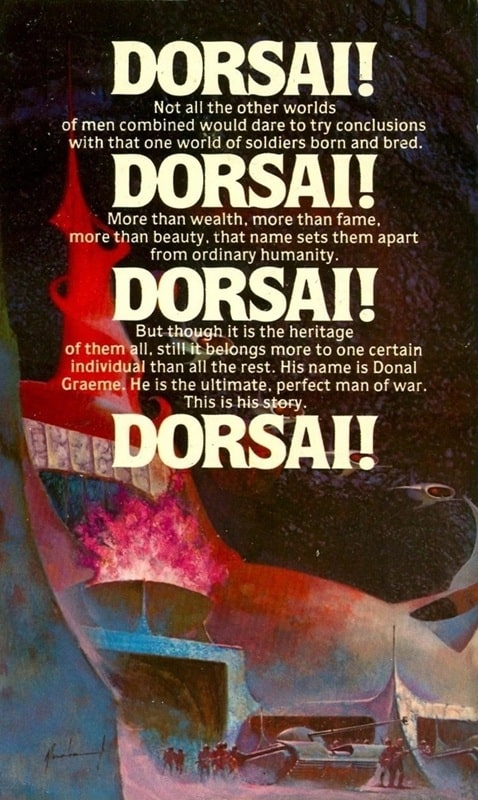
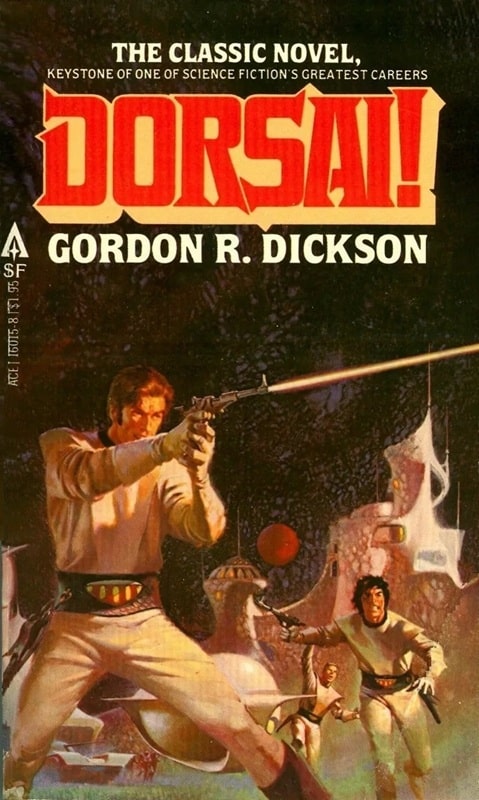
Dorsai! by Gordon R. Dickson (Ace Books, February 1980). Cover by Jordi Penalva
In 1959, Robert A. Heinlein published Starship Troopers, one of the founding works of military science fiction as a genre. But that same year saw the serialization of Gordon R. Dickson’s Dorsai! in Astounding Science Fiction, a work that may have been equally influential, though it seems now to be less remembered. In fact, both were nominated for the Hugo Award in 1960, though Starship Troopers won.
Dorsai! is set in an interstellar future, with some sixty billion human beings inhabiting 16 planets of eight solar systems. Several of the stars are named in the novel, and as was common at that time, many of them are astrophysically implausible candidates to have biospheres, being of spectral types with relatively short lifespans: Altair (type A7), Fomalhaut (type A4), and Sirius (type A0). Fomalhaut and Sirius are also multiple stars, which limits the possible planetary orbits around them. At least Ceta, orbiting Tau Ceti, is a plausible Earthlike planet! It’s also noteworthy that several of these solar systems have multiple habitable planets — though that’s also true of our own, where Dickson has Mars and Venus humanly colonized, a project that seemed far more daunting only a few years later!
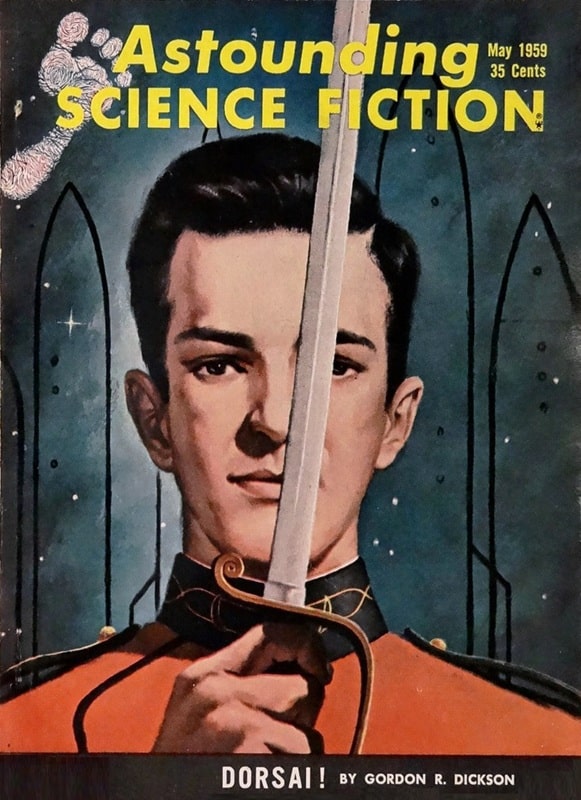 Astounding Science Fiction, May 1959, containing the first installment of Dorsai! by Gordon R. Dickson. Cover art by H. R. Van Dongen
Astounding Science Fiction, May 1959, containing the first installment of Dorsai! by Gordon R. Dickson. Cover art by H. R. Van Dongen
But all this is somewhat beside the point, because unlike his lifelong friend Poul Anderson, Dickson isn’t writing about the physics of his planets, or the biology it enables. To a first approximation, his focus is sociology: the planets of his interstellar future have largely divided up into groups that emphasize different types of human activity, almost like the varnas [“castes”] of ancient India — and different ethical values along with them.
Thus, we have the “Venus group” (Venus itself, Newton, and Cassida), whose focus is on technology and the physical sciences; Ceta, a planet of commercial enterprises and investors; the “Friendlies,” Harmony and Association, two worlds of devout monotheists; the “Exotics,” Mara and Kultis, whose emphasis is partly philosophy (more in the Hindu or Buddhist style than in the Western) and partly a science of human potential, called ontogenetics, that apparently can be used for selective breeding for specific desired behavior.
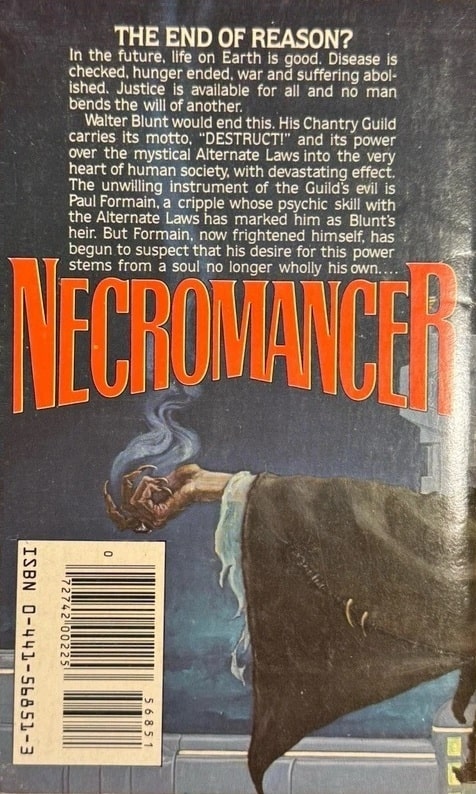
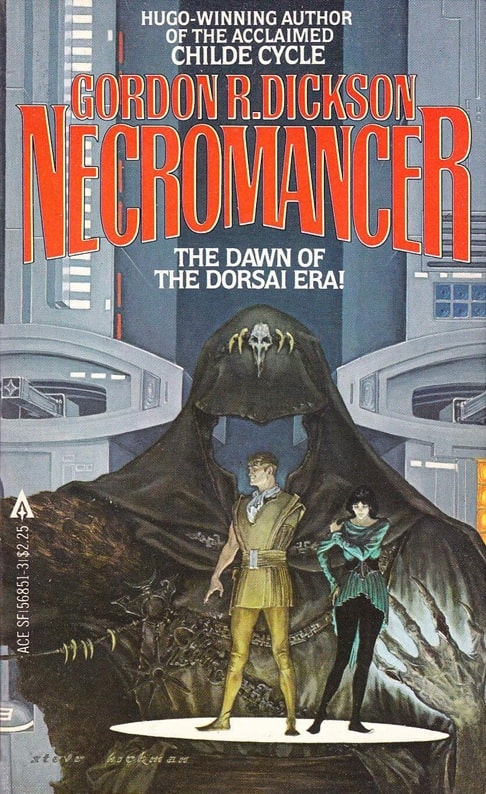
Book 2 in the Dorsai series: Necromancer (Ace, April 1981). Cover by Stephen Hickman
And then there’s the Dorsai, for whom the book (and several of its sequels) is named. It’s the name both of a planet and of the people who inhabit it. Compelled by a shortage of natural resources, their men hire out as mercenaries, known as the best soldiers in the humanly inhabited universe, both naturally talented at war and intensively trained. One of these is Dickson’s protagonist, Donal Graeme, the focus of the entire narrative.
This diversity of planetary societies sets up the novel’s conflict. In the first place, the planets are specialized, not merely in broad cultural patterns, but in economic detail. There are more specialized occupations than any one planet can afford to train for itself; the human race has a sixty-billion-person division of labor. This creates a need for specialists from each planet to travel to other planets where their services are needed, just as the Dorsai do.
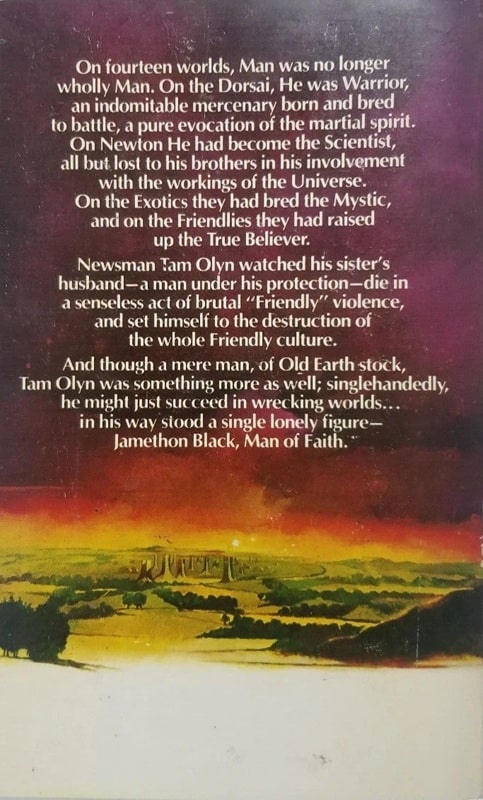
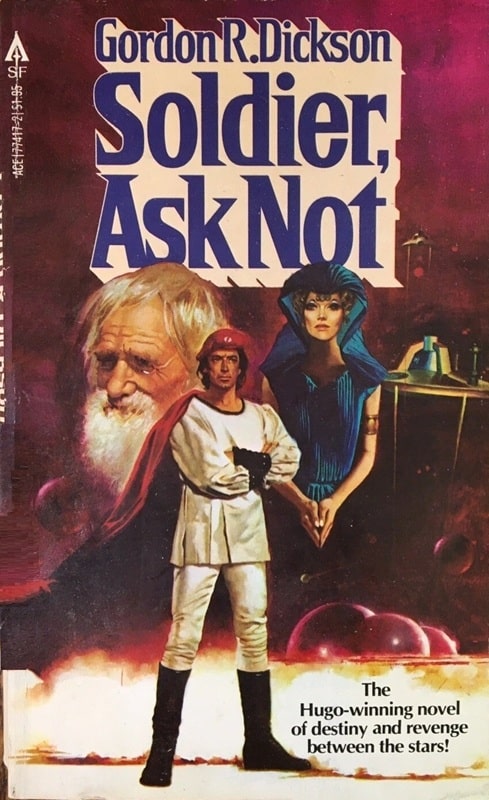
Dorsai, Book 3: Soldier, Ask Not (Ace, March 1980). Cover by Enric
But the terms on which they do so are set in different ways by different planets. At one extreme are the tight worlds: the technologically advanced Venus group, the religiously fanatical Friendlies, and Coby, a mining world controlled by a criminal cartel. At the other are Old Earth and Mars, described as “republican worlds”; the Exotics; and the Dorsai, which are counted as loose worlds.
In between are several miscellaneous worlds, including the commercial Ceta and two worlds with strong central governments, New Earth and Freiland. The tight worlds treat labor contracts virtually as indentures and are in a position to dominate the labor markets, putting them at odds with the loose worlds.
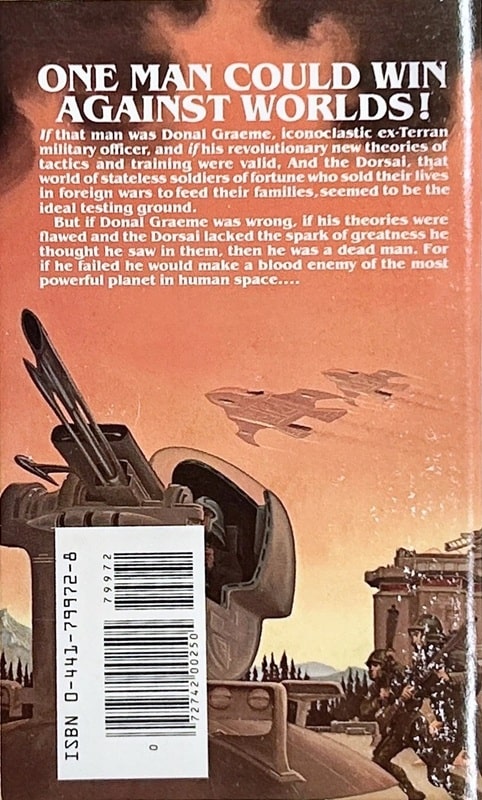
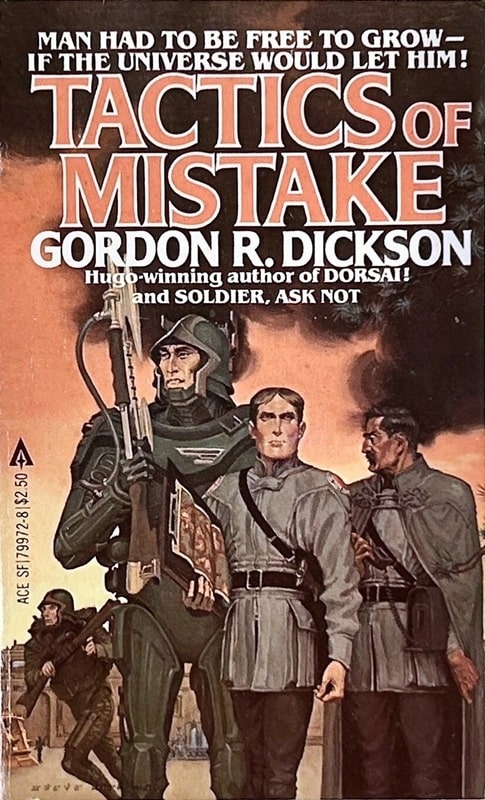
Dorsai, Book 4: Tactics of Mistake (Ace, May 1981). Cover by Stephen Hickman
It struck me on this reading that Dickson’s view of Harmony and Association seems to have changed as he wrote the series. Here they are harshly authoritarian societies with no evident redeeming features. In Soldier, Ask Not, published eight years later, they appear much more sympathetically, and it seems that Dickson’s unfinished final volume would have shown them as an essential element in the reunited human race — the element of faith, as the Dorsai are courage and the Exotics wisdom. (The other major tight faction, the Venus group, are seemingly left behind as having nothing essential to add to human destiny.)
Donal Graeme himself fits this theme of human reunification: both of his grandfathers were Dorsai, but both of his grandmothers Maran. (This hybrid ancestry made me think of another military genius in later science fiction, Lois McMaster Bujold’s part-Betan, part-Barrayaran Miles Vorkosigan.) This gives him a peculiar mix of abilities. He’s a brilliant warrior and commander, fitting a work of military fiction. But he also have some gifts that transcend normal humanity, as he’s told during his employment by the Exotics.
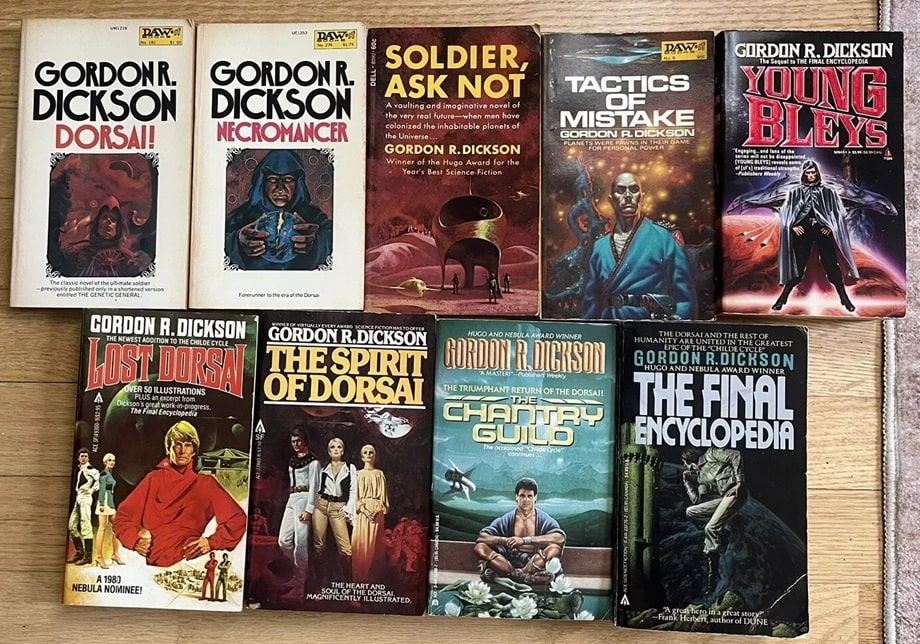 Nine paperbacks in the Dorsai series by Gordon Dickson (also called the Childe Cycle)
Nine paperbacks in the Dorsai series by Gordon Dickson (also called the Childe Cycle)
We get a foretaste of this when he finds himself able to walk on air, apparently simply by believing he can! But more profound than that is a peculiar kind of insight that deepens over the course of the novel, as a result of various stressful experiences. And that insight sets him up, almost from the outset, as an opponent of another major character: William of Ceta, a master entrepreneur whose aim is to take full advantage of the interstellar labor market.
Donal and William become both political and romantic rivals, but both rivals reflect Dickson’s underlying theme of human destiny and the question of who will shape it. In this theme, Dorsai! in a lot of ways transcends the category of military science fiction.
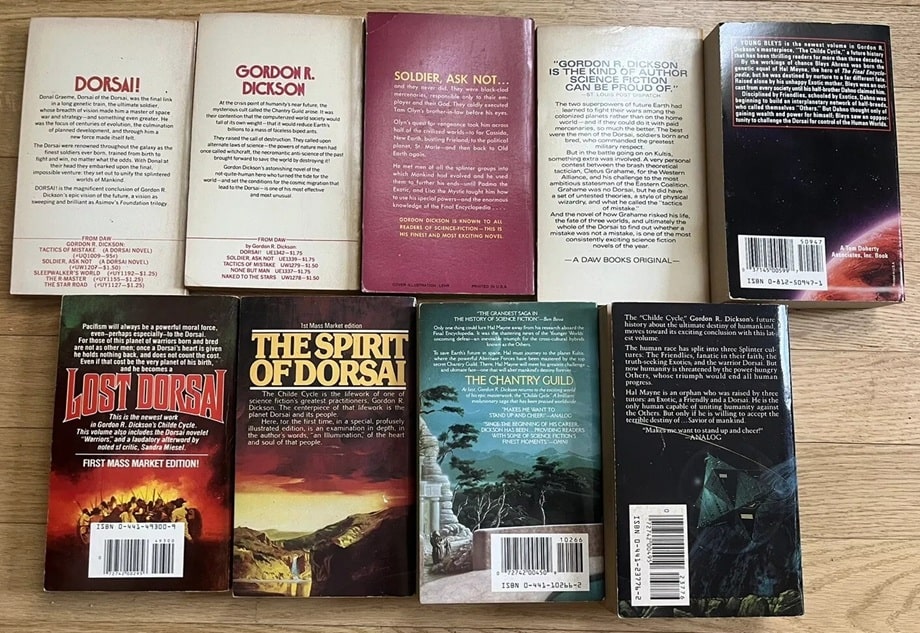 Nine paperbacks in the Dorsai series by Gordon Dickson (back covers)
Nine paperbacks in the Dorsai series by Gordon Dickson (back covers)
On one hand, this theme strikes me as more mythological than science fictional — which I’m not sure Dickson would even have disputed! On the other hand, it points the way toward the deeper emotional resonance of some of the later books, especially Soldier, Ask Not.
Dorsai! also sets a pattern Dickson will follow in later novels in the series, of presenting conflict ultimately not as a clash of institutions (despite his comments about loose and tight worlds) but as a collision of two larger than life figures on opposing sides: not so much realistic fiction as epic. This volume is a somewhat simple first presentation of the theme, but at the same time one of the clearest in the series.
William H. Stoddard is a professional copy editor specializing in scholarly and scientific publications. As a secondary career, he has written more than two dozen books for Steve Jackson Games, starting in 2000 with GURPS Steampunk. He lives in Lawrence, Kansas with his wife, their cat (a ginger tabby), and a hundred shelf feet of books, including large amounts of science fiction, fantasy, and graphic novels. His last article for us was a review of Singularity Sky by Charles Stross.
Women in SF&F Month: Final Week & Week in Review
This year’s Women in SF&F Month ends this week with one more guest post and an international giveaway. Thank you so much to last week’s guests for their excellent essays! Before announcing the rest of this year’s schedule, here are last week’s guest posts in case you missed any of them. All guest posts from April 2025 can be found here, and last week’s guest posts were: “The Power of Community” — Pat Murphy (The Falling Woman, Points of Departure) […]
The post Women in SF&F Month: Final Week & Week in Review first appeared on Fantasy Cafe.Galadon is now available in Kindle Unlimited
Comment on A Beginner’s Guide to Drucraft #35: Introduction to Essentia Capacity by Skeeve
In reply to Benedict.
I presume theres a way to keep a drucrafter personal level lows by external means – to limit their action potential – when holding someone against their will?
And knowing the wickedness of the world this can evolve into torture?
Or is it purely up to the person themselves?
Schooled in Magic – Kindle Unlimited
Over the last few weeks, the rights to the Schooled in Magic books has started to revert to me. This is an ongoing process, at least partly because I’m trying to line up the old reviews and audiobooks with the new e-books, but I have uploaded the first six to Amazon and placed them all in Kindle Unlimited, in hopes of attracting more readers <grin>.
If you haven’t seen or tried the series, why not try now?
But what is the Schooled in Magic series about, you might ask?
Imagine a person swept into another world, where she discovers she has magic and goes to a magic school; imagine that same person having the historical insights and technological knowledge to trigger an industrial revolution, a revolution that both allows magic and science to interact in ways previously considered impossible and also unleashes social change, from empowering peasants and commoners to demand better treatment to giving them the tools they need to demand freedom, liberty, and self-determination. In this series, Harry Potter meets Lest Darkness Falls: the war is not just against the forces of darkness, but also against everything that is held back the development of human civilisation and threatened the rights of man.
And in the first six books, Emily sows the seeds that will become a tidal wave of change.
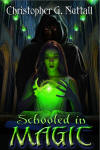
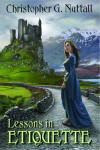
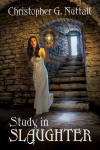
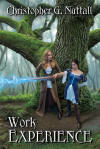
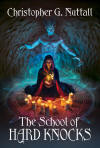

Comment on A Beginner’s Guide to Drucraft #35: Introduction to Essentia Capacity by Kevin
In reply to Benedict.
Huh I guess Scar and Diesel were somewhat competent, it seemed kinda of odd that they were with House Ashford… unless Charles knew they weren’t that effective and did it to undermine Lucella seems like something he would do.
Did William, Stephen’s Dad get training and sigls from House Ashford despite his young age? If so I could see why Charles took him marrying his daughter so badly for some reason I got the feeling they saw each other as a surrogate father/son relationship for some reason.
Comment on A Beginner’s Guide to Drucraft #35: Introduction to Essentia Capacity by Bill
In reply to Benedict.
Many thanks for that – Doh! I was thinking it was more complex – somewhat like that Tier specialist used.
Tubi Dive, Part III
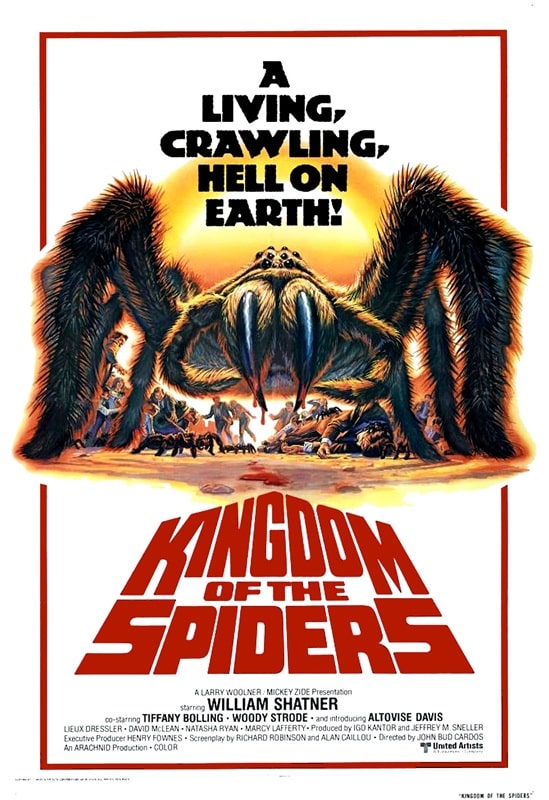 Kingdom of the Spiders (Dimension Pictures, November 23, 1977)
Kingdom of the Spiders (Dimension Pictures, November 23, 1977)
50 films that I dug up on Tubi.
Enjoy!
Kingdom of the Spiders (1977)Ah, the 70s. My formative years. Angry nature films were rampant around this time (much to my delight), and now it’s time for tarantulas to be miffed at our overuse of pesticides.
William Shatner plays Rack Hansen (staggeringly good name), a lecherous animal doctor in rural Arizona. When I say lecherous, I mean toward female humans. When Woody Strode finds his prize calf dead, the Shat is called in to figure it out. He calls in an expert from Flagstaff, and unfortunately for the expert, she is hot and blond. Shatner is all over her like tribbles on a starship.
They eventually ascertain the death was caused by spider bites, and then all eight-legged hell breaks loose.
The film is seriously daft in some spots, egregiously misogynistic in others, and cheesy to the extreme, but I had a great time with it. The climax in town is particularly Irwin Allen-style over the top chaos, and the final shot, though portrayed through a sub-par matte painting, is suitably chilling.
Worth a look if you haven’t seen it.
7/10
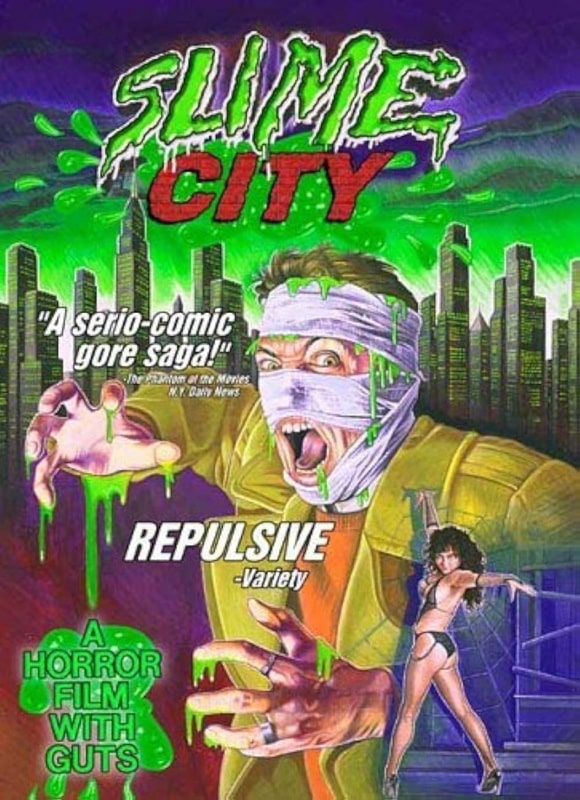
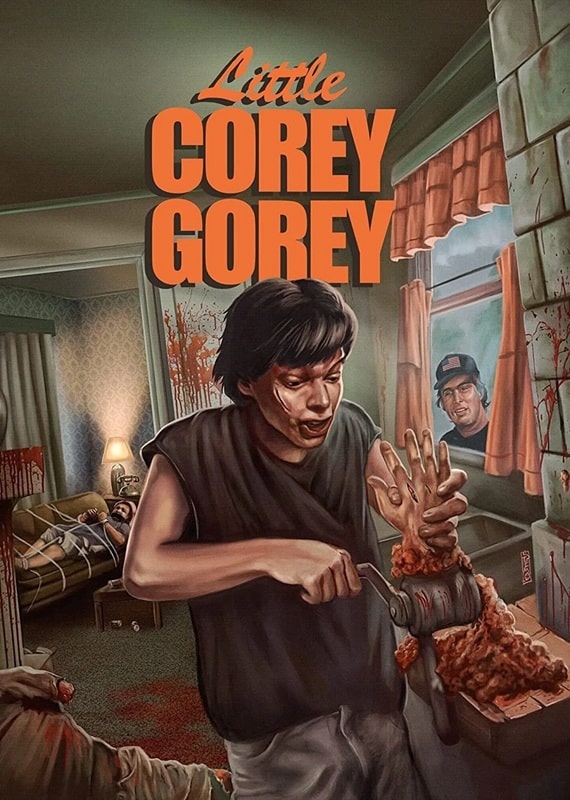
Slime City (Media Blasters, 1988) and Little Corey Gorey (DML, 1993)
I’m sometimes asked why I haven’t gotten around to watching The Brutalist or Wicked yet, and that’s because I’m too busy watching this sort of stuff.
Alex moves into a decrepit apartment building and soon encounters some fellow tenants (goth poet Roman and seductive vamp Nicole), both of whom are into eating ‘Himalayan yogurt’ and drinking a strange green liquor. It turns out these vittles are the sustenance of cultists who have possessed their bodies, and Alex is next in line. Tempted by the drink and Nicole’s jangly bits, Alex succumbs to the dark sorcery afoot, and slowly turns into a slimy murderer, ultimately going full Darkman. As you do.
It’s all quite daft and low-budget, but the dodgy line delivery and goop-stained pillows are all worth it for the final act, which involves Re-animator-levels of dismemberment (albeit less refined).
Alex’s prudish girlfriend and sex crazy Nicole are played by the same actor, Mary Huner, and I have to give her credit for fooling me. The effects are mucky and rubbery, and there are a couple of funny lines, mostly from Alex’s doofus pal.
A good entry-level flick for other fare such as Street Trash or The Abomination.
Slightly recommended.
6/10
Little Corey Gorey (1993)I’ve seen this one listed as a comedy (it’s not), and a slasher (still not), but at the end of the day, Little Corey Gorey is just a nasty bit of schlock, and not the good kind.
It’s that timeless story of a teen (9th grader) bullied and tortured by his step-mother and brother to the point where he snaps and goes on an accidental killing rampage. There’s not much else to the plot, but that usually doesn’t bother me when I’m watching one of these flicks.
However, virtually all of the main characters are so cartoonishly vile, including our ‘protagonist,’ that it was ultimately a miserable watch.
Corey, for whom we are supposed to be rooting, is a creepy, knicker-sniffing stalker and, though he certainly doesn’t deserve the abuse from his step-family, it’s impossible to sympathize with him. The only characters in this film with any decency are a Black family that live next door, and I trust this was done for a reason. There is an ongoing subplot about an escaped serial killer, but this one is nipped in the bud fairly quickly when it could have been used in a far more interesting way.
3/10
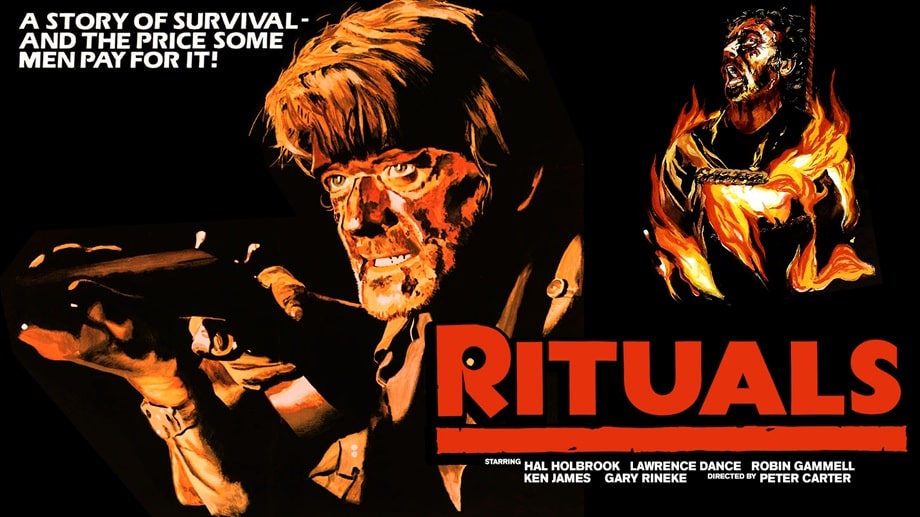 Rituals (Astral Films, August 26, 1977)
Rituals (1977)
Rituals (Astral Films, August 26, 1977)
Rituals (1977)
Here’s a Canadian film (shot in Northern Ontario) that is often dismissed as a Deliverance rip-off — but it’s much more than that. Sure, it takes the form of the tried and tested ‘fish out of water’ genre by throwing five surgeons into the remote wilderness to try and survive a deranged killer, but there’s a grittiness to the whole affair that elevates the film. Also, the characters are well-written, and an early scene where they are trying to cross a river, a scene full of unintended plunges and improvised cajoling, helps us to empathize with the group before their nightmare begins.
The kinetic camerawork gives the film an authenticity, and semi-obscured shots from the killer’s POV provide a real sense of danger. Before this film I’d never really appreciated Hal Holbrook as anything more than an interesting character actor, but he really impressed me with his physical and emotional depth.
Definitely worth a look.
8/10
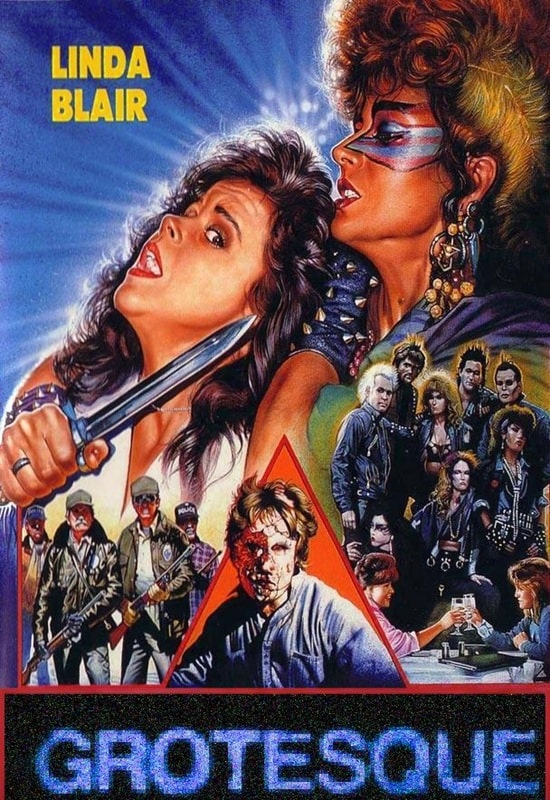 Grotesque (Empire Pictures, 1988)
Grotesque (1988)
Grotesque (Empire Pictures, 1988)
Grotesque (1988)
You want weird, and yet strangely compelling? I’ve got you.
Grotesque is executive produced (and briefly stars) Linda Blair, and Tab Hunter has a main role in it, along with Donna (Angel) Wilkes, so the schlocky cult movie DNA is intact. However, this home invasion horror is such an odd beast; bookended by a couple of movie fake-outs, and being a lot tamer than one might expect for a film that has special effects at its core.
The tale is as old as time: a special effects artist invites his family to their remote lodge, where they are set upon by a roving gang of ‘punkers’ who proceed to slaughter said family. This is witnessed by a disfigured man-child, who promptly goes on a murderous punk-slaying spree, and then the film shifts gears into a boring police procedural complete with prolonged ‘good cop/bad cop’ routine, while Linda Blair excuses herself offscreen. Then it turns into a sort of Twilight Zone episode and then descends into a ‘comedic’ finale (your experience may vary).
My brain is telling me I enjoyed it — but I really don’t listen to my brain any more.
5/10
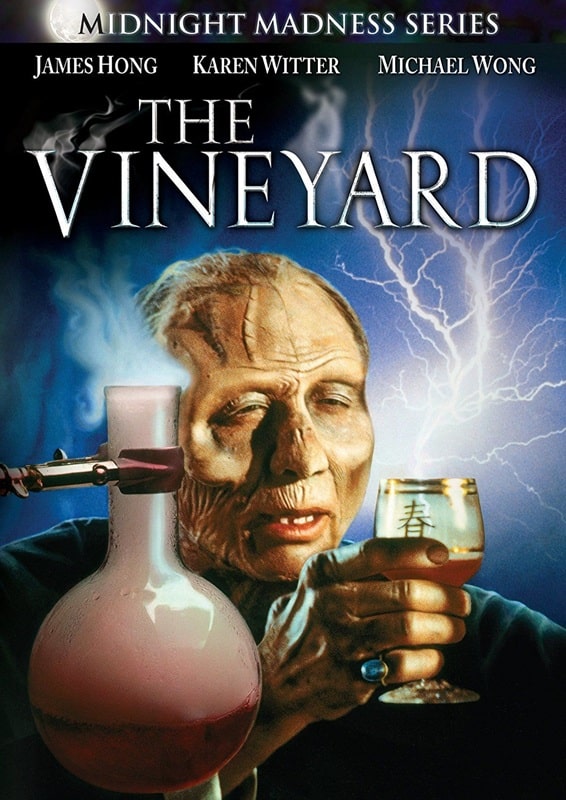
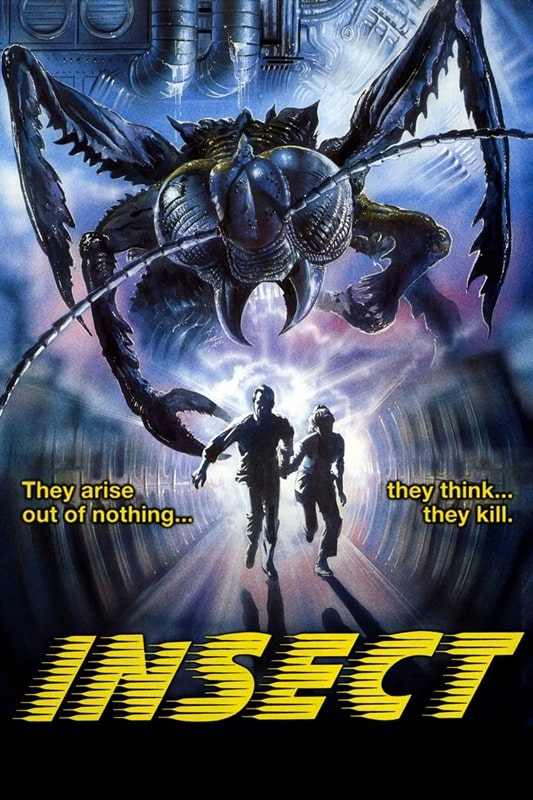
The Vineyard (New World Pictures, 1989) and
Insect! (International Spectrafilm, September 25, 1987)
James Hong, right? RIGHT?
We all love him, from Big Trouble in Little China to Everything Everywhere All At Once, from Kung Fu Panda to Balls of Fury.
James decided he wanted to make a horror film, so he wrote one, co-directed it, and starred in it. What makes him a legend? Did I mention he wrote this for himself?
EXT. DAY
A large, gothic mansion bordered by lush foliage. A bird cries in the distance.
DR. PO (me, James Hong) is standing on a balcony, fondling the pert chesticles of a blond lady.
CUT TO:
INT. BEDROOM
DR. PO (me) is having it away with the blond lady. She’s still naked.
DR. PO (me)
Awesome. I love knockers, me.
You go, James Hong!
The Vineyard is a tale as old as time (again). The descendant of a long line of immortals has become a famous vintner, but his secret ingredient is chained up ladies, of whom he supps in a strange concoction to maintain his youth (his middle age TBH). When he’s finished with them he buries them in the back yard where they lay as restless zombies, unable to rise because he is keeping them in the ground with Mayan voodoo.
Dr. Po holds a fake audition at his mansion for a fake film and a lot of pretty girls and boys turn up for it, only to discover that they are mere ingredients for his latest vintage. Po is also keeping his ancient mom in the attic room, and she is a dead ringer for Zelda from Terrahawks (if this means anything to you).
Shenanigans ensue, involving much running, shooting of arrows, extremely heavy facial prosthetics and dodgy late 80s visual effects. It’s drastically cheesy and somewhat hilarious, and I had a great time. God bless James Hong.
7/10
Insect! (aka Blue Monkey) (1987)Find any dictionary worth its salt, look up ‘hokey’ and you’ll find the poster for this film. Then you’ll see a small print addendum that reads “see also: hilariously awesome.”
Insect! is a proudly Canadian schlockfest, and it features a who’s who of the best Canadian character actors; John Vernon, Don Lake, Joe Flaherty, Robin Duke, and a 7-yr-old Sarah Polley!
The main protagonist is a weather-beaten detective played by Steve Railsback, who I always thought had more of a serial killer look than a leading man, but hey ho — I’m sure he has his fans.
Long story short, an old fella is infected by a parasite, which promptly busts out of him, grows enormous, makes itself a mate and goes into egg production, all the while eating the hospital staff.
Speaking of the hospital, this has to be the most unsecure, ethically murky, run-down medical establishment ever put on film — and I’ve seen Session 9.
Anyhoo, nurses are eaten, bugs are squished and Steve smokes next to a pregnant lady. The gore is limited but gooey, and the effects on the whole are surprisingly fun. Special shout out to a gaggle of seemingly parent-less children who run free around the hospital (and are, in fact, responsible for all the deaths in the film).
See it if you enjoy stickiness.
6/10
Previous Murkey Movie surveys from Neil Baker include:
Tubi Dive, Part I
Tubi Dive, Part II
What Possessed You?
Fan of the Cave Bear
There, Wolves
What a Croc
Prehistrionics
Jumping the Shark
Alien Overlords
Biggus Footus
I Like Big Bugs and I Cannot Lie
The Weird, Weird West
Warrior Women Watch-a-thon
Neil Baker’s last article for us was Part II of Tubi Dive. Neil spends his days watching dodgy movies, most of them terrible, in the hope that you might be inspired to watch them too. He is often asked why he doesn’t watch ‘proper’ films, and he honestly doesn’t have a good answer. He is an author, illustrator, teacher, and sculptor of turtle exhibits. (AprilMoonBooks.com).
Comment on A Beginner’s Guide to Drucraft #35: Introduction to Essentia Capacity by Benedict
In reply to Bill.
It’s pretty much exactly the same as making sigls. Anyone with basic shaping skills can take the essentia from a Well and crystallise it into a piece of aurum. And even if you can’t shape, there are sigls that can do the job instead.
Comment on A Beginner’s Guide to Drucraft #35: Introduction to Essentia Capacity by Bill
In reply to Benedict.
Oh! That sound both interesting and very useful for Stephen!
At the moment I’m still not understanding how essentia gets taken out of wells and stored – perhaps you need an engineer and a machine as per the Tier raid…
Intense Sibling Relationships | 6 Novels of Rivalry, Malice, Duplicity…and Murder
Sibling relationships can resemble a battlefield more than a family gathering. In this LitStack Rec,…
The post Intense Sibling Relationships | 6 Novels of Rivalry, Malice, Duplicity…and Murder appeared first on LitStack.
Comment on A Beginner’s Guide to Drucraft #35: Introduction to Essentia Capacity by Benedict
In reply to Bill.
Depends on the armsman. New recruits don’t have sigls at all. Higher-ranked ones have continuous sigls that operate automatically. Elite, long-serving armsmen might eventually get tapped for drucraft training and would get active sigls that they could use on their own. This puts quite a lot of power (and wealth) into the hands of the armsman, though, so this is something you only do if you trust the person.
Comment on A Beginner’s Guide to Drucraft #35: Introduction to Essentia Capacity by Benedict
In reply to Jim Sackman.
Yes, there are Primal sigls that do exactly that.
Comment on A Beginner’s Guide to Drucraft #35: Introduction to Essentia Capacity by Benedict
In reply to Allan.
Pretty much, yes. There are some bad consequences that come from running too low on personal essentia for too long, but that’s a topic for another article (and it’s quite rare for that to happen unless you’re doing it deliberately for some rason).
Comment on A Beginner’s Guide to Drucraft #35: Introduction to Essentia Capacity by Bill
Do the Armsmen actually have any drucraft skill or are their protection/attack sigls set on “automatic” and operate unconsciously?
While one can’t change ones personal essentia capacity by very much perhaps skilled drucrafters are able to design sigls that, while doing the same job, have a lower Lorenz rating? I’m thinking, for example about the Slam Sigl, where it could be set on continuous charge-up and only require attention from the drucrafter to activate the stored charge in a fight. Might this lower the Lorenz rating?
Comment on A Beginner’s Guide to Drucraft #35: Introduction to Essentia Capacity by Jim Sackman
Since we know that essentia can be stored at least temporarily from the draining of wells, is it possible to provide a short term boost of essentia capacity using some sort of storage device.
Clearly this would be for a triggered effect but just thinking that this might be a way to boost an effect for a short period of time. Think of an extra strong push or light.
The Inheritance: Chapter 3 Part 1

I opened my eyes. A jagged stone ceiling spread above me, glowing softly with swirls of alien growth.
I hadn’t imagined the nightmare. It happened.
I stared at the ceiling for a long breath and checked my watch. The digital skin was dark, with a spiderweb of cracks across it. Must’ve happened when I smashed into that rimstone after the blast.
Lying here would accomplish nothing. I had to get out of this hellhole.
I sat up slowly. The generator was still going, and three of the five floodlights had survived, illuminating the cavern with bright puddles of electric light. The inside of my head burned, my back throbbed, and my right leg felt like someone had rolled an asphalt compactor over it. But I was still breathing.
“Is anyone alive?”
Silence. Just me and the corpses.
“Anyone?”
Something nudged my side. I whipped around. Bear sat next to me, her smart brown eyes focused on my face with unwavering canine intensity.
I wasn’t by myself. The dog was with me.
“Hi Bear.”
Bear tilted her head. Her left side was dark and wet. Blood. It started near her shoulder and bled down over her leg onto the paw. Shit.
“Hold on, girl.”
I pushed to my feet. My right leg whined but held my weight. Oh good. I took two steps before I remembered the bone sticking through my skin.
I pulled my right pant leg up. An angry red welt marked my calf, smudged with dried blood. That was it. The wound was gone.
I’m losing my mind.
My leg was broken. I had looked at it and then hid it with my coveralls. The pant leg was stained with dark red, the result of a massive bleed. I’d left a blood trail half across this cavern. I looked up. There it was, a ragged chain of dark smears.
I felt the edge of rising panic and shoved those thoughts right down before they dragged me under. It didn’t matter right now. I had to see what was going on with Bear’s shoulder.
I made my way to the nearest pond. A bright turquoise hard hat lay on the rocks. I had a sick feeling that Stella might have been wearing it.
Nope, not going to think about that either.
“Come here, Bear.”
The shepherd padded over.
“Stay.”
Bear sat.
I needed to clean the blood off her, but who knew what the hell was in this water.
I flexed.
The water looked perfectly clear to my enhanced vision.
My talent pegged it as clean, but there were limits to what I could sense. If Bear had an open wound and I dumped a bunch of alien bacteria into it… But then I crawled all over in that water with an open wound – which was mysteriously not open anymore, and yeah, not thinking about that – and I almost drowned in it. I was pretty sure I’d swallowed a bunch of it. Which was neither here nor there, except if there was some vicious pathogen in it, we were both fucked.
There was water in the canteens. All miners carried some. We would have to save that for drinking. There was no way to tell how long it would take us to get out of this cave.
Suddenly my mouth was dry.
I dipped the hat into the stream, scooped some water, and gently poured it over Bear’s flank, half-expecting the dog to bolt. Bear sat like a rock.
“Stay. What a good girl. The best girl. So good.”
Three hats later, the water ran mostly clear. A gash carved Bear’s skin over her shoulder. It was shallow and not too long. Most of the blood must have come from somewhere else. Someone else.
I exhaled. One of those carts should have a med kit on it.
“Let’s get some antiseptic on that.”
I needed to get across the stream and the slight wobble in my leg said that if I fell, I would regret it. The best place to cross was still the same – the shallow part where Aaron lay in two pieces.
I picked up Bear’s leash and made my way to the crossing. If she yanked me off my feet, there would be hell to pay. I waded into the stream, ready to drop the leash at the slightest tug. Bear whined and followed me. I slowly shuffled across the stream bottom.
“Slow is smooth and smooth is fast.”
The words came out like a curse. Melissa’s face was branded into my memory. I could replay it in my head like a recording. Six years. I couldn’t even remember how many breaches together. She knew my children’s names. She looked straight at me and yelled at London to throw the grenade.
“I thought she was my friend, Bear.”
Bear didn’t answer.
“I saw Melissa push Anja out of her way. And that over there is Anja’s body. She was twenty-six years old.”
Sanders, Hotchkins, Ella Gazarian, they were in front of me when I was sprinting for that exit. My memory served up Sanders being swept away by the blast.
“They were her guildmates. They trusted her, and she fucking left them, and worse, trampled over them trying to escape. Sanders is probably the reason I survived. He took the brunt of that aetherium grenade.”
We cleared the stream and carefully went up the shallow slope to where the carts waited. Water sloshed in my boot. The other one was wet, too.
I tied the leash to the cart, found the first aid kit, and flipped the heavy latches open. A nice big bottle of antiseptic rinse. We were in business.
“Stay, Bear.”
The shepherd sat.
I opened the antiseptic and poured it over the wound. Bear shook but stayed.
“You are so good. Such a good dog.”
I capped the bottle and grabbed a tube of antibacterial gel.
“Melissa’s priority was the mining crew. But London’s priority was keeping everyone safe, and if that failed, keeping me alive.”
I remembered the cold calculation in London’s eyes, too. The way his face iced over when he hurled the grenade. The set of his mouth. I squeezed the gel onto Bear’s wound.
“He was looking straight at me, and his eyes said, ‘Fuck you. I’m not dying here today.’ I was halfway across that stream when he bailed. Five more seconds. That was all I needed. Five seconds, and I would’ve been on the other end of that cave in. What was left of the mining crew would’ve been on the other side. They weren’t even paying attention to us. We could’ve ran all the way to the gate.”
Bear tilted her head, looking at me.
“You know what he said to me? He said, ‘I’ll get you out of here in one piece. The only way you go down is if I’m down, and I’m really good at surviving.’ Well, we know he didn’t lie. That fucker is excellent at surviving.”
I screwed the cap back onto the gel tube.
“The Cold Chaos assault teams are good at clearing the prospective mining sites before moving on. I’ve never seen their escorts deal with anything more serious than a skirmish. The most London had to do was to cut down an occasional left-over creature popping out of its hiding place. This – everything that happened – was the reason why Cold Chaos sent him into the breach. When the worst-case scenario hit, he was supposed to step in. He was supposed to protect us. All those people…”
A sob choked me.
I shut up.
Being an escort captain came with a lot of responsibility, and you didn’t just become one. It wasn’t enough to be powerful or trusted. The position required experience. London had put in years with the primary assault teams. He was seasoned. He looked at those hostiles slicing people like cabbage in passing, and in a split second he knew that he had never encountered anything like them and nothing he had in his arsenal could stop them. He saw death, and he made a deliberate choice to save himself.
He could’ve waited. He could’ve stood in that gap for another ten seconds and let the rest of us escape, but it was a risk, and he chose his life over ours. The only reason Melissa made it out was because she happened to be close enough and he would need a witness to back up his story. When your job is to put yourself between noncombatants and danger, coming out of the breach alone wasn’t a good look.
Even if they fired him, he would live. That’s all that mattered to him. And if he had been one of the ordinary miners I wouldn’t have a problem with that, but he wasn’t a miner. He was a high-ranking combat Talent. We trusted him. I trusted him, and he threw an aetherium grenade in our faces and ran.
“When death stares people in the face, they revert to their true self, Bear.”
London’s true self was a cold, calculating coward.
I checked myself for scrapes and bruises. I didn’t find any. I had some red welts here and there but no broken skin. I’d crawled on my hands and knees across a rough cave floor dragging my broken leg behind me. My hands and knees should’ve been raw, but I didn’t find any abrasions. I rubbed some gel over the red mark on my leg just in case.
Don’t think about it. That was best.
The generator was next. The industrial model was rated for 7-9 hour run time. The fuel indicator was almost empty. I’d been in this cave for at least 7 hours.
If London made it out of the gate, he would immediately report what happened to the guild. London and Melissa didn’t stay long enough to see how the fight turned out, so for all they knew, there were still active hostiles in this cave. Bodycams didn’t work in the breaches. They still recorded, but you only got static. Cold Chaos would have to rely on London’s testimony, and I was sure that Melissa would confirm whatever he said. She wouldn’t just suddenly grow a heart and admit that she climbed out of the cave over her guildmates’ bodies. As she so often told me, she had mouths to feed.
This was going to go one of three ways.
One, London made it out and reported that I was dead. This was the most likely outcome, because otherwise he would have to own up to leaving me behind.
Two, London made it and reported he left me behind. Not likely. If the DDC found out that he bolted out of the cave abandoning me, Cold Chaos would face heavy sanctions. There would be a fine at best and revocation of gate access at worst. The guild would cut him loose and blacklist him. He would never work for any of the main guilds again.
Three, London and Melissa died enroute. Like Elena said, this breach was a maze, and we had hiked for quite a while to get to this cavern. It was possible that something equally terrible burst out of a side passage and killed those two. The mining crew was required to report back every hour. At least seven hours had passed without check-in. Even if London and Melissa didn’t make it, the guild knew that the mining crew was either in trouble or dead.
No matter which of these three outcomes happened, protocol required the assault team to abandon their progress and address this mess. By now they should have been here to neutralize the threat and retrieve the bodies. Nobody came for the corpses or for the incredibly valuable adamantite, and the breach was still active. That meant only one thing: the assault team was dead.
Bear whined softly. I reached out and petted her back.
Right now, Cold Chaos was likely pulling a new assault team together. The level of threat in this breach was beyond anything I had seen. They would need their top Talents for this, and those people were usually occupied. High ranking guild members made more than celebrity actors, and the guilds worked them to the bone for that money. Getting them all in one place could take days.
The gate opened for entrance twenty-four hours ago. Judging by the power readings, Cold Chaos had anywhere between four to eight weeks to clear it. They thought everyone was dead, so they wouldn’t be in a hurry.
There was another unpleasant possibility. If London did own up to leaving me behind, Cold Chaos could choose to deliberately delay. If I was alive, they would face intense scrutiny. Things would be a lot simpler for them if I was dead. Given enough time in the breach, I would be.
There would be no rescue. I was on my own. If I died here, the kids would be alone. Roger would let them go into foster care. I was sure of it. They were living reminders of his failure as a father, and he had very little tolerance for being held accountable these days.
I’d made a promise to my daughter. I would keep it.
Digging through the cave-in was out of the question. The integrity of the cave ceiling in that passage was shot, which meant moving any of the rocks risked another collapse. No, I would have to go around, through one of those passageways.
I glanced at the end of the cavern. The tunnels stretched into darkness. I would have to go into that darkness, make my way through the breach filled with monsters, ones that probably killed an entire assault team, find the gate, get out, and make sure Cold Chaos didn’t have a chance to stop me. Too easy.
I would need supplies. And a weapon. In a few minutes, the generator would die and take the lights with it.
I had to act fast.
The post The Inheritance: Chapter 3 Part 1 first appeared on ILONA ANDREWS.
Tor Doubles: #3 Brian W. Aldiss’s The Saliva Tree and Robert Silverberg’s Born with the Dead
 Cover for Born with the Dead by Ron Walotsky
Cover for Born with the Dead by Ron WalotskyCover for The Saliva Tree by Lee Edwards
Tor Double #3 was originally published in December 1988. The two stories included are Brian W. Aldiss’s The Saliva Tree and Robert Silverberg’s Born with the Dead. The volume was published as a tête-bêche, with Les Edwards providing the cover art for The Saliva Tree and Ron Walotsky painting the cover for Born of the Dead.
The Saliva Tree was originally published in F&SF in September, 1965. It won the Nebula Award and was nominated for the Seiun Award.
Set in the mid-1890s, The Saliva tree is the story of Geoffrey Rolles, a young gentleman of leisure in the East Anglian village of Cottersall. His head filled with socialism, he has embarked upon a correspondent with H.G. Wells, one of England’s preeminent socialists of the time. He has also taken an interest in local farmer Joseph Grendon, who has demonstrated his forward thinking ways by installing an electric generator on his farm.
The specific events of the story are sparked when Rolles and a friend see a meteor streaking through the sky, possibly striking the earth on Grendon’s property. Although Grendon welcome’s Rolles’s presence, his farmhand, Bert Neckland, sees Rolles as a rival for the affections of Grendon’s daughter, Nancy. Although Rolles claims not to be interested in her, his relationship with her will grow throughout the several months it takes for the story to unroll.
There is an interesting dichotomy to The Saliva Tree, which Aldiss handles well. The average reader, even if they don’t read a lot of science fiction, lives in a world in which the tropes of science fiction have existed since the 1890s and have seeped into the mainstream. For Aldiss’s characters, the concepts are not even new, they are non-existent. Rolles has read The Time Machine, but the ideas of alien invasion or invisible creatures are not part of his world view. Even faced with the evidence, it takes him a long time to begin to understand what is happening, and longer to convince Nancy, Grendon, and others of that truth. And that delay has terrifying consequences for both the human and animal inhabitants of Grendon’s farm.
In many cases where the reader figures out what is happening before the characters, the reader can get annoyed with the characters, but Aldiss manages to avoid this trap, partly by focusing on the characters’ relationships, but also because he has clearly defined Rolles as intelligent and forward thinking (if aimless), and it is clear that he is steps ahead of everyone in putting together the pieces with which he is presented.
Rolles maintains a correspondence with H.G. Wells, who has, by this time, published The Time Machine, but publication of The Invisible Man and The War of the Worlds is still in his future (which places the story in 1896). The implication of Rolles’s letters is that Wells based those two stories on the events that took place on Grendon’s farm, with the creatures’ invisibility inspiring the first novel and their extraterrestrial origin leading to the latter book.
While Wells is the primary and most obvious influence on The Saliva Tree, the isolated setting, the horrors occurring there, and the one person who comes to understand what is occurring despite every bit of human experience, indicates the story also owes a debt to the eldritch horror written by H.P. Lovecraft and his followers. The Aurigans, as Rolles refers to them, remain something of a mystery, but they serve their purpose of being an otherworldly presence that threatens the characters’ understanding of the world and limit their ability to respond, even as they realize what is happening on Grendon’s farm.
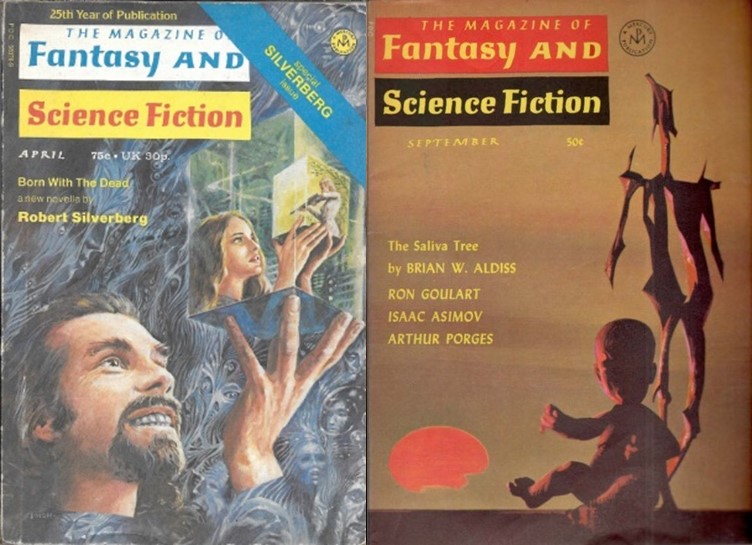 F&SF 4/74 cover by Ed Emshwiller
F&SF 4/74 cover by Ed EmshwillerF&SF 9/65 cover by Bert Tanner
Born with the Dead was originally published in F&SF in April, 1974. It was nominated for the Hugo Award and the Nebula Award, winning the latter as well as the Locus poll. It is also the first of five stories Robert Silverberg had published as part of the series.
Silverberg follows Jorge Klein, who is trying to come to terms with the death of his wife, Sybille. Klein has travelled to the island of Zanzibar, a place his wife had studied and never managed to visit before her death. Klein’s visit to Zanzibar, however, is not just an homage to his dead wife. Upon her death, Sybille went through a process called “rekindling,” which made her a “dead,” a sort of zombie, but one who can continue their life, although the dead cut off all their ties to their previous life and live in “Cold Town” communities. Klein, therefore, is grieving for a wife he knows is still pursuing her interests, just without him.
Sybille is traveling with companions, including dead anthropologist Kent Zacharias, who specializes in the Ohio Mound Builder cultures. Although Silverberg hints that Zacharias and Sybille have become a couple, he doesn’t fully explore their relationship and it may be a more platonic relationship built on shared interests. When Klein indicates he wants to meet with Sybille Zacharias informs him that she has no interest in meeting with Klein.
Despite the rebuff, Klein continues in his attempt to talk to Sybille, going so far as to work with a friend to impersonate one of the dead and travel to a Cold Town to try to meet with Sybille, breaking all rules of propriety that govern the relationships between the living and the dead. In the process, Silverberg is able to show the biggest different between the living and the dead. The rekindled have left their emotions behind. Sybille (and her companions) may not want to meet with Klein, but they seem incapable to getting angry at him for his attempts to talk to his one-time wife.
Klein, for his part, can’t accept that he is living in a world where his wife walks among the living, but is no longer interested in him, unable to get past her death, which in many ways is more reflective of a divorce. He seems positive that if he can only talk to her she would be willing to take him back into her “life,” despite what everyone tells him.
Eventually, Klein’s intrusiveness eventually becomes too much for Sybille and her companions and they have to come up with a way to help Klein get over his sense of loss since Sybille’s death and his inability to understand that even though she still exists, he is no longer part of his life.
Silverberg sets up an interesting problem, and his way of flipping the narrative between Klein and Sybille almost makes it difficult to tell whose story he is telling. In death, Sybille has a group of friends and seems to have a full life, while in life, Klein is alone, using his acquaintances to achieve the goal he is fixated on to the detriment of his job and life. Born with the Dead is an interesting and well-crafted look at a pervasive love that turns into something worse with the death of one of the partners, placing it against a fantasy background, since the method of rekindling is described in scientific terms, but without a scientific rationale.
Ann interesting note. While the concept of the Tor Doubles is that neither side is the A-side, the placement of the ISBN on one side makes it feel like the B-side. With the publication of the third Tor Double, there is a further distinguishing feature. For the first two volumes, the titles on both sides of the book were embossed. Beginning with this volume, only one of the titles is embossed.
 Steven H Silver is a twenty-time Hugo Award nominee and was the publisher of the Hugo-nominated fanzine Argentus as well as the editor and publisher of ISFiC Press for eight years. He has also edited books for DAW, NESFA Press, and ZNB. His most recent anthology is Alternate Peace and his novel After Hastings was published in 2020. Steven has chaired the first Midwest Construction, Windycon three times, and the SFWA Nebula Conference numerous times. He was programming chair for Chicon 2000 and Vice Chair of Chicon 7.
Steven H Silver is a twenty-time Hugo Award nominee and was the publisher of the Hugo-nominated fanzine Argentus as well as the editor and publisher of ISFiC Press for eight years. He has also edited books for DAW, NESFA Press, and ZNB. His most recent anthology is Alternate Peace and his novel After Hastings was published in 2020. Steven has chaired the first Midwest Construction, Windycon three times, and the SFWA Nebula Conference numerous times. He was programming chair for Chicon 2000 and Vice Chair of Chicon 7.
Captivated by the Alien Warlord - Book Review by Voodoo Bride
 Captivated by the Alien Warlordby Bella Blair
Captivated by the Alien Warlordby Bella BlairWhat is it about:There is nothing in this universe that I want more than to make her MINE.
Rhiannon: Because I was born with a cleft lip, everybody in the village has always thought of me as bad luck. So much so, that I’m beginning to believe it myself. It is not until he, Dracor—our new warlord—rides through our village, that I dare hope for a different future. He is the most handsome man I have ever seen, but I’m convinced he will never notice someone like me, no matter how much I’m falling in love with him.
Dracor: Having earned the title of warlord on my own merits, my dream of commanding my own stronghold has at last come true. I thought I would never desire anything more than being a warlord, but that achievement pales in comparison to when I lay eyes on the human kallini. There is nothing in this world that I want more than for her to be MINE. My pursuit of her is interrupted by strange things happening in my new home, things that indicate the stronghold is haunted.
What did Voodoo Bride think of it:I read another one of Bella Blair's Newsletter Freebies.
This one was... interesting.The overall storyline was more present than in the second freebie I read, and I was cautiously interested in the world. But the spicy scenes...There was so much talk of wetness and wet, I pictured the lead characters floating out of bed because of all the wet! The MINE* might be completely capitalized in the blurb, but in my opinion WET should have been there.
Once again terms like kallini are used with no or minimum explanation what it means and it's left to the reader to understand the meaning in context of the story. Understood: this series uses kallini as a word for woman.
So, in the end I wasn't too happy with this story.One more freebie to go and then I'll decide if I want to read more by Blair and what series might be the most satisfying if I do.
*Don't get me wrong. I really don't mind a bit of possessiveness by the hero or a well placed 'mine'. I just don't see the need to capitalize it.*
Why should you read it:The world is interesting.
Recommended Reading List: January 2025
I read a lot in January and liked a lot of it as well. Some truly marvelous books (which is not what I could say for February & March. More on that in those lists). I also finished my reading for the in-person space opera workshop I was conducting in the middle of the month. Honestly, I didn’t like much of what I read in the brand-new anthologies I found. The stories had no depth or no ending or both. So I don’t have a lot to recommend from those books. Usually I can at least recommend the introductions, but one stunningly left out all the great female space opera writers of the 1990s and barely mentioned the ones in the 2000s. I realize that bias happens, but that one stung on a bunch of levels. (I guess I expect it from old timers, most of whom are not with us anymore, but not folks who were active in those time periods.)
I haven’t yet finished reading The Best American Sports Writing of the Century, because I needed to take a break. The book has a slant that is very white-male oriented. It’s also filled with some challenging pieces that aren’t holding up to the 26 years since the book was printed. (I swear, New Journalism is soooo self-involved.) But some of it is good and interesting and I’ll come back to it when the mood suits me. I doubt I’ll ever recommend the book, but watch: there will be a time when I recommend more essays from it.
I read one of the best novels I’ve seen in years and some great articles. So January was quite a success…which is why this list is so late. It took a while to chronicle my reading.
January 2025
 Anders, Charlie Jane, “A Temporary Embarrassment in Space Time,” New Adventures in Space Opera, edited by Jonathan Strahan, Tachyon, 2024. I absolutely love this story. It’s everything a certain kind of space opera should be—fun, preposterous, believable, tense, and adventurous. All wrapped into a neat and well-written package. A wonderful gem of a story.
Anders, Charlie Jane, “A Temporary Embarrassment in Space Time,” New Adventures in Space Opera, edited by Jonathan Strahan, Tachyon, 2024. I absolutely love this story. It’s everything a certain kind of space opera should be—fun, preposterous, believable, tense, and adventurous. All wrapped into a neat and well-written package. A wonderful gem of a story.
Crais, Robert, The Big Empty, Putnam, 2024. The best book I’ve read all year, maybe in the past few years. I love Robert Crais’s Elvis Cole and Joe Pike. Pike doesn’t show up until halfway through this book because Bob is so dang good at point of view and the way a story should flow. I don’t have a lot of time for leisure reading, and right now, my lack of time is significantly worse. So I did the readerly thing. I stayed up past my bedtime, and Dean literally had to pull the book from my hands. I still read it in two days. Fantastic. And no, I’m not going to tell you much more than “fantastic” because, as with all of Bob’s books, to say more is to ruin a surprise. (I might have already said too much, in fact.)

Deaver, Jeffery, and Maldonado, Isabella, Fatal Intrusion, Thomas & Mercer, 2024. Yep, I have an Amazon link only for this book, because I just discovered something very unpleasant. This book (and a bunch of Deaver novellas) are only available in ebook on Amazon. Sorry about that! I read the book in paper, which is how I prefer to read, so I had no idea that this had happened until the moment I was putting the book on the list. Sigh. It makes me, as a reader, more than mildly pissed off.
The book is good enough. It’s not as good as most Deaver books, but it’s better than a lot of thrillers. I’ll read the next book in the series, and if I like it, I’ll pick up one of Maldonado’s books. Collaborations are a difficult animal. They can be something better than both writers, especially if the book is something they wouldn’t have written without the collaborator. I suppose Deaver could argue that he wouldn’t have had a character like Carmen Sanchez, but except for a few chapters that I suspect were all Maldonado, she felt very generic. So I don’t think this collaboration enhanced the two writers’ work (I’m saying this without having read hers). But this is a good way to while away a few hours.
Fekadu, Mesfin, “The Loophole That Landed Muni Long a Grammy Nom,” The Hollywood Reporter, November 20, 2024. The online version of this article has the title “Muni Long Explains How She Made It,” and I think that is a better title for the content here. Muni Long has been around for awhile, and she has followed her own path. There are some great quotes in here, but the best was her response to how she got paid for her streaming content:
Sometimes you look at your quarterly statement and you’re like, “Oh wow, $1,000 for 500 million streams. Great. That’s awesome.” The sheer volume that I have to write in order to make an income that makes sense [is insane]. What saved me is that I have quality and quantity, whereas some of these people, all they have is one or two records.
Quantity and quality. She’s right. We’re doing the same. Take a look at this one, even if you’re new to Muni Long.
Harris, Robert, , Vintage Books, 2016. I really like Robert Harris’s writing, although his topics don’t always interest me. I picked up Conclave after seeing a review of the film. A lot of my favorite actors are in it, and since I like Harris, I thought I should give the book an eyeball before watching the film. Glad I did. There’s a nice moment toward the end of the book, something completely unexpected and yet set up. It worked for me, and might not have worked in the film (which I have not yet seen). Of course, that had me looking through more Robert Harris for the books I’ve missed. I mostly didn’t order the ones on the topics that I don’t care about, but I did preorder the next. I love his courage as a writer. He’s always doing something interesting. This is a novella, filled with his great characters and marvelous writing. Oh, and for the interested: I am not Catholic, although I was in and out of Catholic churches as a kid because so many of my friends were Catholic. So I have a passing familiarity with some of the rituals, but no great interest in the church or its habits. I still found this fascinating.
, Vintage Books, 2016. I really like Robert Harris’s writing, although his topics don’t always interest me. I picked up Conclave after seeing a review of the film. A lot of my favorite actors are in it, and since I like Harris, I thought I should give the book an eyeball before watching the film. Glad I did. There’s a nice moment toward the end of the book, something completely unexpected and yet set up. It worked for me, and might not have worked in the film (which I have not yet seen). Of course, that had me looking through more Robert Harris for the books I’ve missed. I mostly didn’t order the ones on the topics that I don’t care about, but I did preorder the next. I love his courage as a writer. He’s always doing something interesting. This is a novella, filled with his great characters and marvelous writing. Oh, and for the interested: I am not Catholic, although I was in and out of Catholic churches as a kid because so many of my friends were Catholic. So I have a passing familiarity with some of the rituals, but no great interest in the church or its habits. I still found this fascinating.
Heinz, W.C., “Brownsville Bum,” The Best American Sports Writing of the Century, edited by David Halberstam with Glenn Stout, HarperCollins, 1999. I had never heard of W.C. Heinz before reading this book. Yet many of the other writers in the front half of the book (at least) mentioned him as the best of the best. Well, this is my favorite piece in the book so far. It’s a 1951 piece about someone named Bummy Davis who was a fighter back in the day when fighters could kill each other in the ring. This one reads like a short story—the life and death of kinda thing. The writing itself is sharp and crisp, the events breathtaking. The murder, at the end, shocking because it happened in a bar, not in the ring. If you find the book, read this one first.
Rose, Lacey, “Selena Gomez is Waiting For Your Call,” The Hollywood Reporter, November 20, 2024. Last fall and early this year, there were a lot of interviews with Selena Gomez as the Oscar and Grammy hype heated up. She has a good team. But she’s also a great interview because, as young as she is, she’s had an amazing career. She knows who she is, and she’s blunt about it. I can’t encapsulate this long piece in any coherent way, except to say all writers (and Selena fans) should read it.
Royko, Mike, “‘A Very Solid Book,'” The Best American Sports Writing of the Century, edited by David Halberstam with Glenn Stout, HarperCollins, 1999. A lot of the work in this book is dated. So dated, in fact, that I had to look up some of the rivalries just to see what was going on. But this piece by Mike Royko from 1987 is familiar. I was 27 at the time, and aware of the Mets/Cubs rivalry.
Some idiot at some NY publishing house asked Royko to review a book about the Mets. And oh, did he. This piece is not dated, once you knew about the rivalry, and it is one one of my favorites. I just read it again, out loud this time to Dean. It’s a very short piece that is, ostensibly, a review of a book by Mets first baseman (at the time) Keith Hernandez. And Smith was a Cubbies fan through and through. The book is solid, you see, because it can survive being thrown against a wall…
Really worth reading
 Score, Lucy, Things We Never Got Over, Bloom Books, 2022. Okay, this is annoying. As I set up this post, I discovered that Lucy Score’s ebooks are exclusive to Amazon. Same thing as the Deaver/Maldonado above. Grrrr. You can get the paperbooks anywhere you want, but to get the ebook, you have to go to Amazon. You can’t even go to her own website/store to get the book. Sorry about that. Get the paper. She has some lovely deluxe editions.
Score, Lucy, Things We Never Got Over, Bloom Books, 2022. Okay, this is annoying. As I set up this post, I discovered that Lucy Score’s ebooks are exclusive to Amazon. Same thing as the Deaver/Maldonado above. Grrrr. You can get the paperbooks anywhere you want, but to get the ebook, you have to go to Amazon. You can’t even go to her own website/store to get the book. Sorry about that. Get the paper. She has some lovely deluxe editions.
However, I did find the book on Amazon. I had just finished something else (what I can’t remember) and the algorithm suggested this book. I did what I often do and read the first chapter. And wowza is it good. Seriously, this first chapter is worth reading even if you don’t pick up the book. The chapter is a masterclass of information flow. The chapter title is Worst. Day. Ever. The first paragraph is a perfect hook:
I wasn’t sure what to expect when I walked into Café Rev, but it sure as hell wasn’t a picture of myself behind the register under the cheery headline “Do Not Serve.” A yellow frowny face magnet held the photo in place.
Each paragraph builds on that. With each page, the situation gets worse and worse and worse. You—well, I—had to go to the next chapter immediately. The book ends up being a tiny bit long, and for a moment verges on “if you two only talk to each other, this would end” but by then I didn’t care. The book is fun, the writing is great, and the characters are a hoot. So pick this one up…or at the very least (writers) read that first paragaph.
 Smith, Red, “Next To Godliness,” The Best American Sports Writing of the Century, edited by David Halberstam with Glenn Stout, HarperCollins, 1999. My father, who was born in 1914, used to talk about the great sports writers and announcers from his life. He also talked about great players, so many of their names are familiar to me. Others, not quite as much. But Red Smith was quite familiar. His name was in the air all the time in our family, and also in the various writing classes I had. Red Smith was one of those writers even non-sports fans enjoyed.
Smith, Red, “Next To Godliness,” The Best American Sports Writing of the Century, edited by David Halberstam with Glenn Stout, HarperCollins, 1999. My father, who was born in 1914, used to talk about the great sports writers and announcers from his life. He also talked about great players, so many of their names are familiar to me. Others, not quite as much. But Red Smith was quite familiar. His name was in the air all the time in our family, and also in the various writing classes I had. Red Smith was one of those writers even non-sports fans enjoyed.
Back when my father imprinted on baseball, there was radio, but it was local only. So games played outside of the area weren’t aired. The readers had to rely on the print media.
“Next To Godliness” describes an entire game in maybe 1,000 words. It also describes the reaction to that game from Smith himself. It’s lovely and well done. There’s a reason this man’s work was remembered—at least for another 50 years.
Smith, Thomas, “Dua Lipa Talks 2024,” Billboard, December 14. 2024. I love Dua Lipa’s stuff. I run to it. I also enjoy how she’s running her career, in the same way that I admire the way Taylor Swift is. These women are taking charge in a way that most musicians do not. So read this. She’s interesting and what she’s doing with her business is also great.
Verhoeven, Beatrice, “John M. Chu,” The Hollywood Reporter, November 13, 2024. Fascinating interview with John M. Chu, released just before Wicked came out. (If you haven’t seen Wicked, oh, you must! It’s marvelous.) Lots of great material here, mostly about being courageous. Lots of behind the scenes on his various movies as well. In The Heights, Crazy Rich Asians, and more. Read this one.
Weir, Keziah, “Give And Let Give,” Vanity Fair, October, 2024. I’ve been thinking about this interview ever since I read it, particularly as one particularly nutty billionaire chainsaws his way through American government, another sends his fiance into space, and the rest don’t seem to give a rat’s banana about actual human beings.
Melinda French Gates, former wife of Bill Gates, is also worth billions, and she’s giving it away, systematically, to charity after charity. She says it’s not easy, because she had to have the right organization in place to help funnel the money, and then she has to figure out where she can do the most good. Note the difference: Do The Most Good. Yeah, she’s not the only ex-wife of a billionaire doing this.
It’s fascinating to me that the wealthy women understand their social responsibility and the bulk of the men…do not.

Recent comments